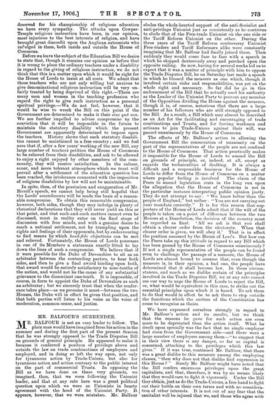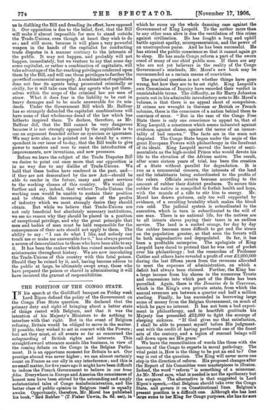MR. BALFOUR'S SURRENDER.
MR. BALFOUR is not an easy leader to follow. The plain man would have imagined from his action in the summer and during the first part of the present Session that he was strongly opposed to the Trade Disputes Bill on grounds of general principle. He appeared to resist it because it conferred a position of privilege above and outside the law on trade combinations of employers and employed, and in doing so left the way open, not only for tyrannous action by Trade-Unions, but also for tyrannous action and action contrary to the public interest on the part of commercial Trusts. In opposing the Bill as we have done on these very grounds, we imagined, then, that we were following the Unionist leader, and that at any rate here was a great political question upon which we were as Unionists in hearty agreement with the head of the Unionist Party. It appears; however, that we were mistaken. Mr. Balfour eludes the whole-hearted support of the anti-Socialist and anti-privilege Unionist just as consistently as he contrives to elude that of the Free-trade Unionist on the one side or the Tariff Reform Unionist on the other. During the three years of the Tariff Reform controversy Unionist Free-traders and Tariff Reformers alike were constantly imagining that Mr. Balfour had finally joined them. Then suddenly they would come face to face with a speech in which he skipped dexterously away and perched upon the opposite railing. So now, having for several weeks led us to expect that it was a matter of principle with him to oppose the Trade Disputes Bill, he on Saturday last made a speech in which he blessed the measure as one which, though it involved certain risks and responsibilities, was yet on the whole right and necessary. So far did he go in this endorsement of the Bill that he actually used his authority as the Leader of the Unionist Party to prevent any member of the Opposition dividing the House against the measure, though it is, of course, notorious that there are a large number of his followers who are still strongly opposed to the Bill. As a result, a Bill which may almost be described as an Act for the facilitating and encouraging of trade combinations and Trusts, and for forcing workmen and artisans to join Trade-Unions against their will, was passed unanimously by the House of Commons.
The effects of Mr. Balfour's action in allowing the Government Bill the consecration of unanimity on the part of the representatives of the people are not confined to the House of Commons. That action practically makes it impossible for the House of Lords to amend the Bill on grounds of principle, or, indeed, at all, except as regards the technicalities of drafting. It is always a difficult and a responsible business for the House of Lords to differ from the House of Commons on a matter where popular feeling is involved The claim of the Peers to amend legislation rests in the long run upon the allegation that the House of Commons is not in the particular instance interpreting public opinion justly. They do not attempt to say : " We know better than the people of England," but rather : "You are not carrying out your mandate correctly." It is for this reason that sup- porters of the House of Lords admit that if the will of the people is taken on a point of difference between the two Houses at a Dissolution, the decision of the country must be regarded as final. All we ask is that you shall obtain a clearer order from the electorate. When that clearer order is given, we will obey it.' That is in effect the position assumed by the House of Lords. But how can the Peers take up this attitude in regard to any Bill which has been passed by the House of Commons unanimously ? If not a single representative of the people can be found even to challenge the passage of a measure, the House of Lords are almost bound to assume that, even though the measure is, in their opinion, a bad one, the people have determined that it shall become law. In these circum- stances, and much as we dislike certain of the principles involved in the Trade Disputes Bill, we at any rate cannot see our way to urge the House of Lords to reject the Bill, or, what would be equivalent in this case, to strike out the essential principles upon which it is based. To ask them to do that would in effect be to ask them to step outside the functions which the custom of the Constitution has come to recognise as theirs.
We have expressed ourselves strongly in regard to Mr. Balfour's action and its results, but we think that the reasons he gave for such action are even more to be deprecated than the action itself. What he dwelt upon specially was the fact that no single employer had risen from the Government side—and there were a large number of employers among them—" to suggest that in their view there is any danger, so far as capital is concerned, attaching to the privileges which this law gives." If it was true, continued Mr. Balfour, that there was a great dislike to this measure among the employing classes, " then why does not that dislike find expression in this House ? " Surely Mr Balfour might have noted that the Bill confers enormous privileges upon the great capitalists, and that, therefore, it was by no means likely that they would care to fight it vigorously. Under the Bill they obtain, just as do the Trade-Unions, a free hand to fight out their battle on their own terms and with no considera- tion of other interests. It is not out of any fear that the capitalist will be injured that we, and those who agree with us in disliking the Bill and dreading its effect, have opposed it. Our opposition is due to the belief, first, that the Bill will make it almost impossible for men to stand outside the Trade-Unions, even though at heart they wish to do so ; and still more, because it will place a very powerful weapon in the hands of the capitalist for conducting trade disputes in ft manner contrary to the interests of the public. It may not happen, and probably will not happen, immediately, but we venture to say that some day some capitalist, or rather a combination of capitalists, will take advantage of the far-reaching privileges conferred upon them by the Bill, and will use those privileges to further the growth of commercial monopoly. A combinationof capitalists does not fear its agents being prosecuted criminally or civilly, for it will take care that any agents who put them- selves within the scope of the criminal law are men of straw. What it does fear is the liability to be cast in heavy damages and to be made answerable for its mis- deeds. Under the Government Bill which Mr. Balfour has so strangely defended the capitalist combinations will have none of that wholesome dread of the law which has hitherto inspired them. To declare, therefore, as Mr. Balfour did, that the Bill cannot be very dangerous because it is not strongly opposed by the capitalists is to use an argument founded either on cynicism or ignorance. We may note also, as is pointed out in detail by a corre- spondent in our issue of to-day, that the Bill tends to give power to masters and men to resist the introduction of improvements, new inventions, and new processes.
Before we leave the subject of the Trade Disputes Bill we desire to point out once more that our opposition is in no way due to any dislike of Trade-Unions. We hold that these bodies have rendered in the past, and— if they are not demoralised by the new Act—should be able to render in the future, many and great services to the working classes of this country. We would go further and say, indeed, that without Trade-Unions the working men would be unable to sustain their position and to obtain that increasing share of the profits of industry which we most strongly desire they should obtain. But while we believe that Trade-Unions are not only beneficial but absolutely necessary institutions, we see no reason why they should be placed in a position of exceptional privilege, and why the great principle that men and bodies of men must be held responsible for the consequences of their acts should not apply to them. The ability to say : " I can do what I like, and nobody can touch me or make me answerable for it," has always proved a source of demoralisation to those who have been able to say it. It has been the canker which has ruined monarchs and aristocracies throughout history. We are now inoculating the Trade-Unions of this country with this fatal poison. Should they be ruined by it, and, having become odious to the public at large, be ultimately swept away, those who have prepared the poison or shared in administering it will have incurred the gravest of responsibilities.



























































 Previous page
Previous page